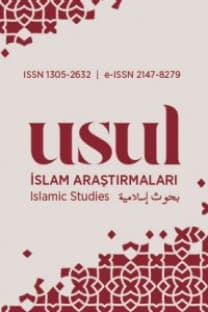Sadruşşeria'da Te'vilin Kodları - Yusuf Kıssası Örneği -
Büyük İslam düşünürü, Hanefî fakîh ve kelam âlimi Sadruşşerîa es-Sânî elAsğar (ö. 747/1346), Yusuf kıssasını yorumladığı Te’vîl-i Kıssa-i Yûsuf başlıklı Farsça bir risale kaleme almıştır ve bunun yegâne yazması Süleymaniye Kütüphanesi, Ayasofya, numara 1980’de kayıtlıdır. Bu makalede mezkûr eserden hareketle müellifin te’vildeki metodu irdelenmekte ve eserin içeriğiyle ilgili malumat ve de- ğerlendirmelere yer verilmektedir. Sadruşşerîa, Yusuf kısasındaki ibret veçhesini irfanî bir zemin üzerine inşa ederken kıssadaki kişi, olay ve olguları enfüse tatbik etmektedir. Bu tatbikten hareketle de işâri ve edebî yorumlara kapı aralamaktadır. Çalışmada, Kur’an’ın yorumu karşısında müellifin konumlandığı yer, kendisine oldukça geniş bir tasarruf imkânı sunan tasavvufî bir nokta olarak tespit edilmekte; diğer bir değişle yorumcunun müdahalesini olabildiğince genişleten irfanî perspektife sahip olduğu ortaya konulmaktadır.
Anahtar Kelimeler:
Sadruşşerîa es-Sânî el-Asğar, Yusuf Kıssası, İşâri Tefsir, Te’vil
Codes of Interpretation in Sadrushariah -Example of the Joseph Parable-
Sadr al-Shariah al-Thanî (d. 747/1346), who is a great Islamic thinker, faqih (Islamic jurist) and mutakallim (scholar of kalam) wrote a large number of books in different fields. Ta’wil-i Qıssa-i Yusuf is one of his worksthat was written in the Persian Language. The only manuscript of this book, with registration number 1980, is currently in the library of Sulaymaniya, Aghia Sophia. Sadr al-Shariah interpreted the Joseph Parable in this work. This paper focuses on contents of this book and it will try to uncover the methodology applied by the author. Sadr alShariah, applies the persons, events and actions that are mentioned in the story, on nafs (enfus), while trying to build the exemplary aspect of the Joseph Parable on the Irfânî (gnosis) base. By doing soö he opens the way for the Ishari (allegorical and mystical) and literary interpretations. This study presents the approaches of author towards the Quran that is rather based on Sufism (mystical). According to this study, the Sufist approach towards the Quran offers the author a quite wide room for interpreting the Quranic verses. In other words, this study will show that, the commentator has an Irfanî (gnosis) approach which allows him to interpret the Quranic verses from a broad perspective.
Keywords:
Sadr al-Shariah al-Thani al-Asghar, Joseph Parable, Ishari (allegorical) Tafsir, Interpretation of the Quran,
- ISSN: 1305-2632
- Başlangıç: 2004
- Yayıncı: İSTANBUL SABAHATTİN ZAİM ÜNİVERSİTESİ
Sayıdaki Diğer Makaleler
Fuad Sezgin'in Buhârî'nin Kaynakları Kitabı Üzerine Değerlendirmeler
Kelâm Düşüncesinde Evren ve İnsan
Sadruşşeria'da Te'vilin Kodları - Yusuf Kıssası Örneği -
Necattin HANAY, Mehterhan FURKANİ
Fuad Sezgin'in Buhârî'nin Kaynakları Kitabı Üzerine Değerlendirmeler
